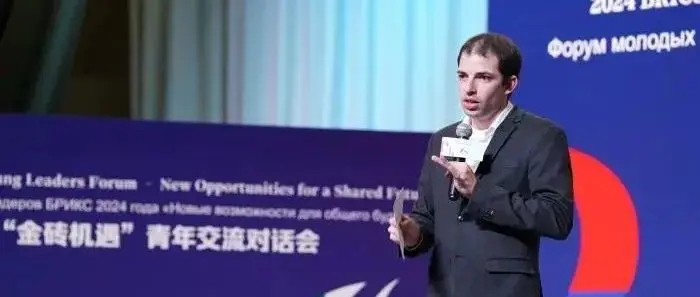BRICS cooperation in the eyes of BRICS students in China

The year marks the beginning of the "Big BRICS Cooperation." From June 1st to 2nd, the 16th Summit of BRICS Leaders will be held in Kazan, Russia.
"BRICS Time" is about to begin, and multiple Chinese students from BRICS countries have been interviewed by China News Service reporters, sharing their perspectives on BRICS cooperation.
"Multiplying" Opportunities
This month, Qin Zhongnan from Egypt began a new life in China, becoming a master's student in the Chinese International Education program at Beijing Language and Culture University.
The experience of having served as a translator made him realize that different native language structures give rise to different ways of thinking, and more cultural nuances are hidden in daily interactions and practical communication, which cannot be learned from books. "I spent years studying Chinese and Chinese culture from books in Egypt, but coming to China, I gained more in less than two months than I ever did before."
This year, multiple countries, including Egypt, officially joined the BRICS cooperation mechanism. In Qin Zhongnan's view, this will bring more opportunities to Egyptian youth.
He believes that BRICS countries have diverse cultures, forming a multi-directional and frequently flowing cultural space under the cooperation mechanism. The expansion of BRICS adds new "multipliers" to this cultural space, injecting rich content while expanding greater opportunities in a "multiplicative" manner.
Taking languages as an example, the BRICS countries encompass a variety of languages such as Chinese, English, Portuguese, Russian, and Arabic. "I can communicate with Chinese and Brazilians who speak Arabic, and with Russians and South Africans who speak Chinese. The better the cooperation, the more opportunities there are, even for studying or working in each other's countries," said Qin Zhongnan.
He then explained his understanding of BRICS cooperation with an Arabic proverb, "It is difficult for one hand to clap alone." "A country is like a hand, and the help from other countries is like another hand. Together, we can clap," Qin Zhongnan said. "I think this is what BRICS cooperation is about—we walk together, grow together, and develop together."

Egyptian student Qin Zhongnan is writing on the blackboard. Photo by reporter Zeng Yue, China News Service.
tolerance and cooperation
When Lin Zirui () first heard the term "BRICS," he was studying in Russia, encountering the term during an undergraduate major course.
Subsequently, Lin Zirui from Russia participated in the Shanghai Summer School (BRICS Program) twice. Through systematic courses and academic research, he gained extensive knowledge about BRICS cooperation from various aspects. During this process, he met young peers from BRICS countries, and the concept of BRICS cooperation gradually became concrete.
The BRICS countries, primarily composed of emerging powers and developing nations, may have diverse cultural backgrounds, but we will transcend differences, consolidate common ground, and work together in unity. In Lin Zirui's view, the essence of BRICS cooperation lies in inclusive multilateralism, where countries engage in in-depth exchanges of views on issues of common concern, reaching broad consensus.
He further cited the saying from his native culture, "A person on the battlefield is not a warrior," to emphasize the importance of inclusiveness and cooperation for the development of BRICS countries.
It is difficult to achieve significant development through individual efforts alone; we must unite and cooperate with others and other nations to achieve higher efficiency and better results.
The opportunity to study in China was the most direct benefit that the BRICS cooperation brought to Zi Rui Lin.
This year marks Lin Zirui's second year pursuing a Master's degree in Journalism and Communication at Peking University. He has already traveled through numerous cities in China. He hopes to gather firsthand data for academic research while deepening his understanding of China's cultural heritage through the diverse cityscapes.
organic organization
Not long ago, Brazilian student Wei Te ( ) participated in the "BRICS Opportunities" Youth Exchange Dialogue in Kazan, Russia. This was his third trip to Russia this year to attend BRICS-themed events.
On the date, the "BRICS Opportunities" Youth Exchange Dialogue was held in Kazan, Russia, where Brazilian student Wei Te participated and delivered a speech. (Photo provided by interviewee)
Since then, Wei Te has been living in China. Before entering the School of Social Sciences at Tsinghua University for graduate studies, he worked and started businesses in China.
"At first, I wasn't very interested in international relations, but after interacting with people from different countries, I found it fascinating to pay attention to and understand the driving forces behind how the world operates." As a result, Wei Te changed his previous passive approach and actively chose BRICS cooperation mechanisms as the focus of his academic research during his graduate studies.
The solidarity and cooperation among BRICS countries is a voluntary, natural process without external coercion, maintaining interactions at multiple levels including politics, economy, culture, education, and health, involving both bilateral and multilateral relations. In Witt's view, the "Great BRICS Cooperation" constitutes an organic cooperation matrix.
Currently, Wei Te is preparing for his master's thesis. He plans to outline the development trajectory of BRICS and "BRICS Plus," and analyze the operational mechanisms of BRICS cooperation.
For the expanded "BRICS family," he expressed his expectations using the Portuguese word for "hope." "The BRICS countries, working together in consensus, addressing challenges, bring hope for a world of multipolarity that is equal and orderly."
Title: "BRICS Cooperation in the Eyes of International Students from BRICS Countries in China"
Editor: Dai Shuo Deputy Editor: Song Fangcan
An important Israeli soldier was killed
](http://mp.weixin.qq.com/s?__biz=MjM5NDI2MDc5NA==&mid=2659522128&idx=1&sn=ee2b342bbf2abd856a8719d0e15edd2f&chksm=bdfbc4058a8c4d133a5f12e1b9d820380434f7879a6b7738a555c358f745eae079306f64db78&scene=21#wechat_redirect)
[
Zhou (year of birth) was approved for execution by lethal injection, to be carried out immediately.
](http://mp.weixin.qq.com/s?__biz=MjM5NDI2MDc5NA==&mid=2659522103&idx=1&sn=74bf0aabc72988d94d35320069f5216c&chksm=bdfbc4628a8c4d74d4db0418f8360217afd9b439bbe9d1f2b8925444ece9b20ba397a622696b&scene=21#wechat_redirect)
[
DJI Sues the Pentagon, Complaint Details →
](http://mp.weixin.qq.com/s?__biz=MjM5NDI2MDc5NA==&mid=2659522086&idx=1&sn=99091adc2475846d2d37b8063003e0e2&chksm=bdfbc4738a8c4d6530e2ceedfa6132784edcffa972da8e8b63c1d05be195c37e73e29ec1da7f&scene=21#wechat_redirect)
